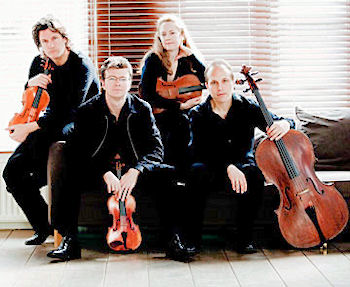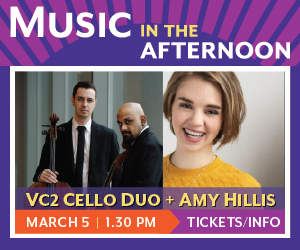After writing last month’s column, touching on the fragility of Toronto’s new music festivals, sad news followed. Contact Contemporary Music had to pull the plug on its New Music Marathon due to a lack of funding. This one-day, dynamic and free music festival in the heart of the city only managed to turn out two editions before it was met with financial challenges. Here’s to hoping it can get back up on its feet soon.
 However, one outfit on which we can rely to remain a stable champion of new music is the St. Lawrence String Quartet, which is celebrating its 20th anniversary this season.
However, one outfit on which we can rely to remain a stable champion of new music is the St. Lawrence String Quartet, which is celebrating its 20th anniversary this season.
Formed in 1989 by violinists Geoff Nuttal and Barry Shiffmann (replaced by Scott St. John in 2006), violist Lesley Robertson and cellist Marina Hoover (replaced by Christopher Costanza in 2003), the St. Lawrence first settled in Toronto to take advantage of a special training programme run jointly by the U of T Faculty of Music and the Royal Conservatory. While the ensemble was warned that the chances of survival were slim, it defied the odds with early, career-boosting collaborations with performers like violinist Jaime Laredo and pianist Anton Kuerti. A move to New York City in 1990, to study with the Emerson Quartet, led to two years as Juilliard’s graduate quartet-in-residence, and then on to teaching assistantships with the Tokyo Quartet at Yale University in 2004. In between, the quartet came to international attention by winning several key prizes, including the first Banff International String Quartet Competition in 1992.
The rest, as they say, is history. The St. Lawrence has since gone on to record with EMI, creating award-winning discs of both standard and new repertoire by contemporary composers like Christos Hatzis and Osvaldo Golijov. Currently they are the ensemble-in-residence at Stanford University, and maintain a vibrant international concert calendar of some 100-150 performances per season.
Over its history, the quartet has become well known as a champion of more adventurous works, which they present with the same characteristic passion, intensity, physicality and malleable approach to style that they bring to their entire repertoire. As the quartet has continued to age and improve technically, it has also fervently protected these qualities. “This is the constant challenge,” said Nuttal in a recent interview with The Strad magazine “to try and get better in terms of…all of the important stuff, and not lose that edge.”
It has also protected its loyalty to Canada and Canadian composers. And so – unlike some other quartet anniversaries that focus on well-worn quartet cycles – the St. Lawrence Quartet has partnered with the Canadian Music Centre, CBC Radio 2 and a handful of private donors and music presenters to commission five Canadian composers from across the country. The Quartet will arrive back in Toronto on November 16 after a tour of Atlantic Canada to present the culminating concert of this commissioning project at Walter Hall – the first time all five works will be performed together on one programme.
The St. Lawrence was hard pressed to select just five composers from the trove of almost 90 submissions they received back in the fall of 2007, when this project as launched. “To hold in our hands such a body of work from Canadians, coast to coast, was tremendously inspiring,” said Robertson, who coordinated the project. In trimming the selection down to the final group, the quartet was struck again and again by the diversity, creativity and strength of all the submissions. But in the end, only five could be selected, and so composers Marcus Goddard, Elizabeth Raum, Brian Current, Suzanne Hébert-Tremblay and Derek Charke were invited to join the St. Lawrence’s Anniversary Commissioning Team. The resulting works are themselves as diverse as Canada itself.
BC-based Marcus Goddard created Allaqi, inspired by the katajjaq style of Inuit throat singing. The title, which means “a clearing of the clouds” reflects the music’s movement from a place of darkness to brightness. Imitative textures and rhythmic patterns jump from instrument to instrument in the style of katajjaq, evaporating into folk song-based melodies, lyricism and calm simplicity. Murmurings of the opening rhythms grow again, but are softened by broad melodies that guide the work to its conclusion.
Elizabeth Raum, who hails from Saskatchewan, was inspired by the landmark Bushwakker Brewpub in Regina’s Old Warehouse District to write her work, Table at the Bushwakker. The piece’s opening introduces the various characters that are portrayed throughout the work. The scene is a typical Saturday night at the pub, where the tables are full of students, amorous couples and women out for a “girl’s night” on the town.
 Toronto composer Brian Current based his work, Rounds, on initial sketches made while staying in Kyoto, Japan, over the spring of 2008 and completed during the winter months in Toronto. The title refers to the use of melodies throughout the work that overlap and layer one another, much like the musical rounds children sing in the school yards.
Toronto composer Brian Current based his work, Rounds, on initial sketches made while staying in Kyoto, Japan, over the spring of 2008 and completed during the winter months in Toronto. The title refers to the use of melodies throughout the work that overlap and layer one another, much like the musical rounds children sing in the school yards.
Suzanne Hébert-Tremblay, who makes her home in Québec, drew on a fascination with nature and birds to compose A tire-d’aile. The work is built up from the song of three specific birds: the common loon, the hermit thrush and the song sparrow. These songs make up the core musical material, which is repeated and developed through four distinct sections in the first part of the work, and then overlapped in a polyphonic style for the second part. Both parts are framed by a lyrical theme inspired by loon song.
Finally, New Brunswick-born composer Derek Charke offers a musical journey from the present to the past in his Sepia Fragments. The work plays off of several quotations, both original and borrowed, that appear to be sometimes clear, sometimes blurred, like memories captured in a time capsule. Fiddle tunes and reels dissolve to fragments of harmonics and trills. Snippets of Shostakovich transition into parlour music. Tchaikovsky-inspired tunes gives way to Vietnamese folk melody.
In addition to this culminating concert, the St. Lawrence has opened their November 16 afternoon rehearsal to the public. Anyone wishing to attend this free session may benefit immensely by observing the interaction between the Quartet and the composers, some of who will be hearing their work for the first time. The session, which will run 1-4 pm in Walter Hall, will include demonstrations and conversation with the musicians and the Commissioning Team.
For concert details and to purchase tickets, visit www.music.utoronto.ca, call 416-978-3744 or e-mail boxoffice.music@utoronto.ca.
Jason van Eyk is the Ontario Regional Director of the Canadian Music Centre. He can be contacted at: newmusic@thewholenote.com.



